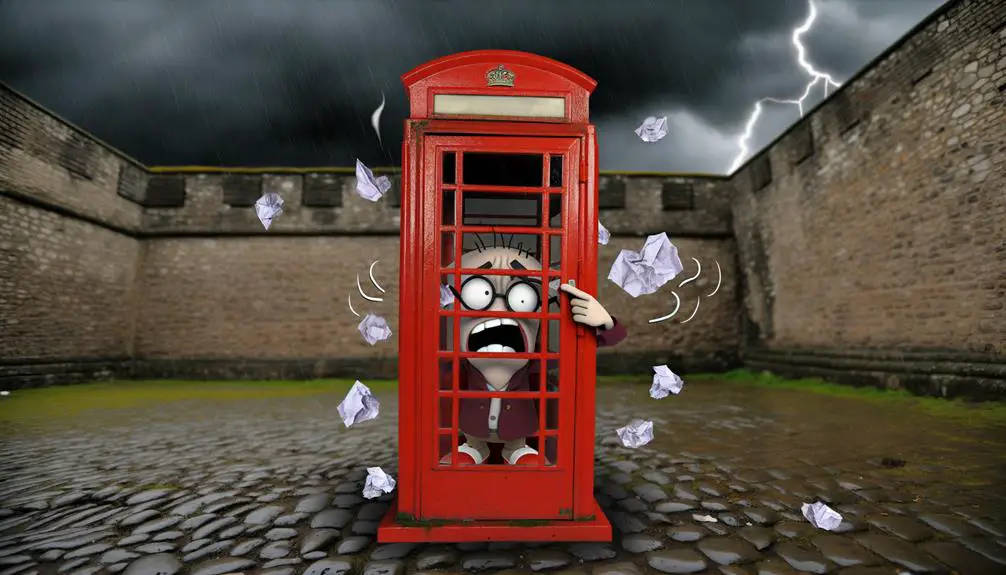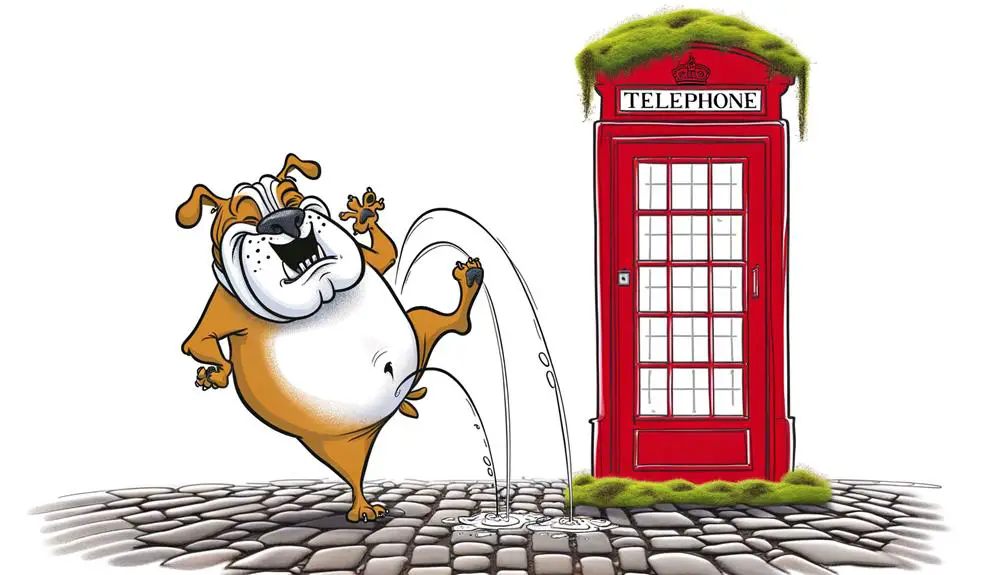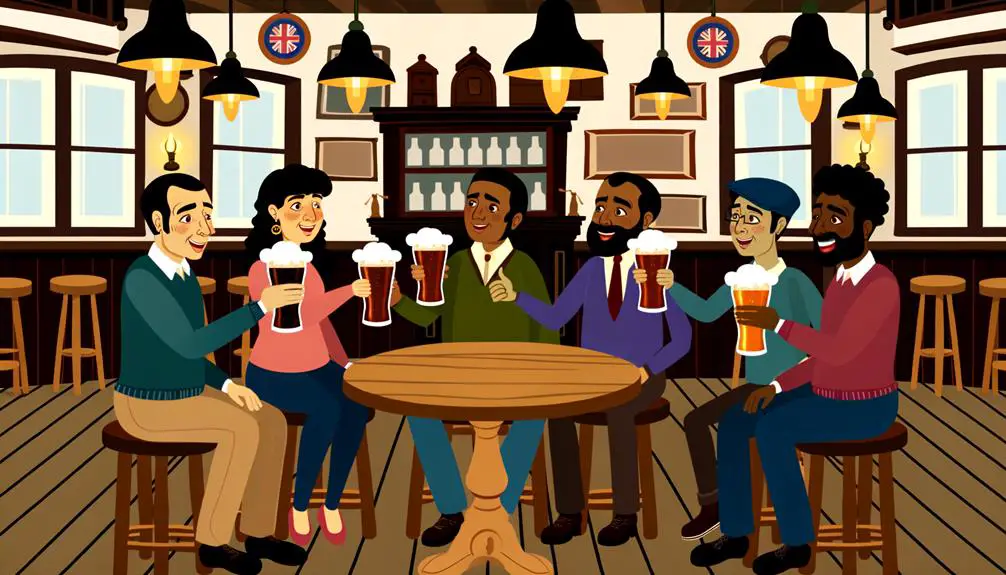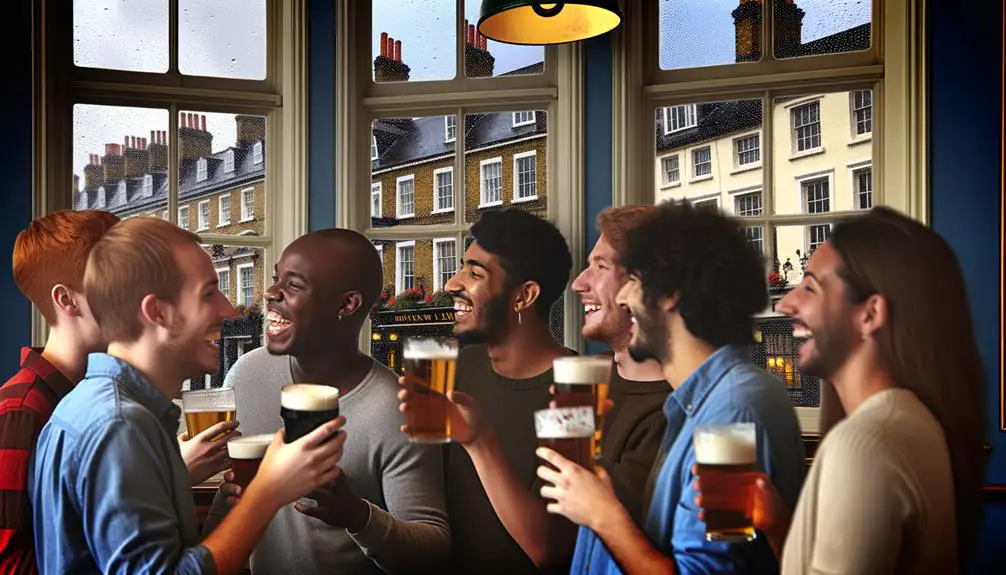In British slang, "piss" has a dynamic meaning beyond just urination. You'll find it colorfully describing annoyance or displeasure, like in the phrase "pissed off." It also vividly marks intoxication; when someone's "pissed," they're not just tipsy—they're drunk. But there's more. The phrase "taking the piss" showcases the term's flexibility, pointing to mockery or teasing, a staple of British humor. These usages highlight cultural attitudes toward alcohol, humor, and social interaction. From expressing annoyance to intoxication, "piss" mirrors the linguistic evolution of British English, intertwined with societal norms. Unpacking these layers offers deeper insights into British culture and language.
Key Takeaways
- In British slang, 'piss' commonly refers to urination.
- 'Pissed' is a widely used term to describe being heavily intoxicated.
- The phrase 'taking the piss' means to mock or joke with someone.
- 'Piss' integrates into idiomatic expressions, reflecting British humor and attitudes.
- Its usage varies from casual to crude, depending on context and setting.
Origins of "Piss" in Slang

The term 'piss,' with its origins deeply embedded in Middle English, has evolved remarkably in British slang, reflecting broader cultural and linguistic shifts. You might find it fascinating that 'piss' etymology traces back to the Latin word 'pissiare,' which means to urinate. This term, over centuries, has woven its way through the linguistic fabric, morphing in usage and connotation, yet retaining its fundamental essence.
As you explore further into the linguistic evolution of 'piss,' you'll notice that its journey is a proof to the fluidity of language. Initially, its usage was purely literal, confined to the act of urination. However, the versatility of English, especially within the rich tapestry of British slang, has allowed 'piss' to adopt numerous forms and meanings, transcending its original confines.
This transformation isn't merely a linguistic curiosity; it's indicative of societal attitudes and the inherent adaptability of language to convey complex ideas, emotions, and states of being. The way 'piss' has been integrated into various expressions and idioms in British slang showcases the creativity and dynamism of linguistic evolution.
Understanding the origins and evolution of 'piss' in slang offers you a unique lens through which to view the interplay between language, culture, and society. It's a vivid illustration of how words can shift in meaning, influenced by changing societal norms and cultural contexts, while still retaining a thread to their historical roots. This exploration into 'piss' etymology and linguistic evolution reveals the richness and complexity of language, especially within the vibrant spectrum of British slang.
Expressing Annoyance or Displeasure

When you're exploring the rich tapestry of British slang, understanding how 'piss' is wielded to express annoyance or displeasure is vital.
You'll find that common phrases, nuanced usage, and the potential for misinterpretation shape its role in everyday speech.
Being aware of these aspects helps you grasp the subtleties of British communication and avoid unintended offense.
Common Annoyed Phrases
Understanding common annoyed phrases in British slang offers a window into the nuanced ways Brits express displeasure or annoyance. Delving into this linguistic facet, you'll encounter a variety of expressions that range from angry retorts to frustration expressions, each showcasing a distinct shade of irritation. These phrases aren't just words but reflections of cultural attitudes towards conflict and discomfort, subtly hinting at the British penchant for understatement and dry wit even in moments of annoyance.
| Expression | Category | Usage Context |
|---|---|---|
| "I'm cheesed off" | Frustration | Mild annoyance |
| "Don't get shirty with me" | Angry retort | Warning against attitude |
| "He's lost his rag" | Anger | Extreme annoyance |
This table encapsulates the spectrum of annoyed phrases, from the simmering frustration to boiling anger, illustrating the rich tapestry of British slang.
Slang Usage Nuances
Delving into the intricacies of British slang reveals how expressions of annoyance or displeasure aren't just about the words themselves, but also about the context and subtlety with which they're delivered. Regional variations play a significant role in how these expressions are perceived and understood.
For instance, the same phrase might be considered mildly irritating in one area but could be seen as highly offensive in another. Additionally, pronunciation differences can alter the intended message dramatically. A sharply pronounced phrase might convey a stronger sense of annoyance compared to a more casually spoken one.
Understanding these nuances is essential for accurately interpreting and using British slang, especially when expressing feelings of annoyance or displeasure.
Misinterpretation Risks
Mastering the intricacies of British slang, you'll find that misinterpreting expressions of annoyance or displeasure can lead to awkward, and sometimes tense, social situations. Language evolution and cross-cultural communication play significant roles in how these misunderstandings occur, highlighting the importance of context in decoding slang.
| British Slang | Potential Misinterpretation |
|---|---|
| 'Pissed off' | Simply drunk, not annoyed |
| 'Taking the piss' | Being serious, not mocking |
| 'Piss poor' | Extremely poor, not just lacking wealth |
| 'Piss about' | Wasting time, not just wandering |
| 'Piss up' | A party, not a mess |
Understanding the nuances behind these phrases promotes smoother interactions, fostering better cross-cultural understanding and avoiding the pitfalls of language barriers.
Describing Intoxication

In British slang, saying someone is 'pissed' often means they're heavily intoxicated, reflecting a casual yet vivid vernacular for drunkenness. This term encapsulates more than just the act of drinking; it's a cultural nod to the social and often communal aspect of alcohol consumption in the UK. When you explore the British pub culture, you're not just entering a world of pints and spirits but also one where drinking games and the camaraderie they foster are paramount. These activities aren't just about the alcohol itself but about the shared experience and the stories that emerge from these sessions.
Understanding the concept of being 'pissed' as a descriptor for intoxication also brings into focus the informal sobriety tests that friends might employ. It's not uncommon for mates to tease each other about their ability to walk in a straight line or recite something backwards—a playful yet telling sign of how embedded the concept of 'pissed' is in evaluating one's level of intoxication.
This term, with its allusions to loss of control and the humorous attempts at regaining sobriety, offers a glimpse into the British psyche. It's a term that's as much about the social fabric as it's about the alcohol, illustrating a collective understanding and acceptance of the highs and lows of drinking culture. The use of 'pissed' to describe intoxication is a sign of the nuanced, often self-deprecating British humor and a reflection of the cultural significance of alcohol in social bonding and storytelling within the UK.
Indicating Urination

Another common usage of 'piss' in British slang pertains to the act of urination, reflecting a significant yet informal expression deeply ingrained in the language. While it might strike you as crude or unrefined, this term is widely accepted across various contexts in the UK, from casual conversations among friends to more colorful expressions in media. It's important, though, to understand the cultural nuances and settings where such language is appropriate.
The act of urinating, or 'taking a piss,' is a natural bodily function, but the way it's discussed can reveal a lot about societal attitudes toward privacy, hygiene, and even humor. In Britain, public restrooms, often referred to colloquially as 'public loos,' are commonplace and their availability is a sign of the country's regard for public hygiene and convenience. However, discussions around the use of these facilities can still be laced with humor and slang.
| Aspect | Description | Cultural Insight |
|---|---|---|
| Public Restrooms | Widely available and typically maintained. | Reflects the UK's commitment to public hygiene. |
| Hygiene Practices | High standards, with expectations of cleanliness. | Demonstrates the societal value placed on health and cleanliness. |
| Usage in Media | Often used for comedic effect. | Highlights the British penchant for humor in everyday life. |
| Contextual Appropriateness | Generally accepted in casual settings. | Indicates the informal and relaxed nature of British communication. |
| International Perception | Might be seen as crude elsewhere. | Suggests the unique cultural acceptance within the UK. |
In analyzing the use of 'piss' to indicate urination within British slang, you uncover not just a word, but a window into the UK's cultural attitudes towards privacy, hygiene, and humor. It's a reminder that language evolves with society, serving as both a reflection and a driver of cultural norms and values.
"Piss" in Idiomatic Expressions

You'll find that 'piss' in British slang isn't just about the bathroom—it's woven into a variety of expressions that reveal much about the culture.
These phrases, from 'pissed off' to 'taking the piss', offer a rich tapestry of meanings, each carrying its own weight and context in social situations.
Understanding them not only helps you decode conversations but also provides insight into British humor, camaraderie, and societal norms.
Common Piss Phrases
Frequently, British slang incorporates the word 'piss' into idiomatic expressions, reflecting a blend of humor, irreverence, and cultural nuances. You'll encounter phrases like 'piss break' and 'piss contest,' which vividly convey the situations they describe. Here's a quick guide to understanding some common piss phrases:
| Phrase | Meaning | Context |
|---|---|---|
| Piss break | A short break to use the toilet | "Need a quick piss break during the road trip." |
| Piss contest | A futile argument or competition | "Stop this piss contest; it's getting us nowhere." |
| Pissed | Drunk or very angry | "He was absolutely pissed at the party." |
| Taking the piss | Mocking or making fun of someone | "Are you taking the piss out of me?" |
| Piss poor | Extremely poor or of very low quality | "The service at that restaurant was piss poor." |
These phrases reveal the versatility and color of British slang, offering insight into its playful and sometimes blunt communication styles.
Expressions Cultural Significance
Exploring the cultural significance of 'piss' in idiomatic expressions unveils a rich tapestry of British humor and societal attitudes. You'll discover that these expressions aren't just crude language but a reflection of social adaptation and linguistic evolution.
They showcase the British penchant for irony and understatement, demonstrating how language evolves to convey camaraderie, frustration, or even affection in uniquely humorous ways. This linguistic journey through 'piss' idioms reveals a society's capacity to play with language, transforming what might be deemed vulgar into symbols of cultural identity.
It's a demonstration of the dynamic nature of language, where even the seemingly offensive can become cherished and integrated into the fabric of everyday communication, illustrating the nuanced relationship between words and their cultural resonance.
Cultural Impact and Usage

In British culture, the slang term 'piss' carries a nuanced significance, reflecting both the playful and sometimes harsh realities of social interaction. Its usage isn't uniform across the UK; regional variations color its meaning and application, adding layers to its understanding. In the north, you might hear 'taking the piss' in jest, while in the south, the same phrase can carry a slightly more offensive connotation. This diversity highlights the rich tapestry of British dialects and social customs, making the term a fascinating study of linguistic flexibility.
International perceptions of 'piss' as British slang also vary, with non-Brits often finding themselves perplexed by its casual yet complex use. You might find it intriguing how British media exports have played a pivotal role in familiarizing global audiences with the term, albeit sometimes leading to misunderstandings. The characteristically British humor, which often includes self-deprecation and irony, is embodied in the term's usage, embodying a cultural identity that values wit and resilience.
Understanding the cultural impact and usage of 'piss' in British slang requires you to appreciate the context in which it's used. It's a term that serves as a litmus test for social rapport; knowing when and how to use it can signal your understanding of British social nuances. Whether it's bonding over a pint or negotiating the complexities of workplace banter, the term 'piss' encapsulates the multifaceted nature of British camaraderie and communication. It's a confirmation to the dynamic nature of language, constantly evolving and adapting to the contours of cultural interaction.
Frequently Asked Questions
How Has the Use of the Word 'Piss' in British Slang Influenced Linguistic Trends in Other English-Speaking Countries?
You've noticed how linguistic trends travel across borders, haven't you?
The use of 'piss' in British slang has greatly impacted English-speaking countries through global influence analysis and cultural exchange mechanisms.
It's a fascinating example of how words can evolve and shape conversations in diverse societies.
Are There Any Notable Literary or Cinematic Works Where the Slang Usage of 'Piss' Plays a Significant Role in Character Development or Plot Progression?
You've probably noticed how slang shapes characters and plots in literature and film.
When it comes to 'piss,' playwrights and screenwriters often weave this word into their narratives to add authenticity or humor. This usage can greatly influence character development or drive the story forward.
It's a demonstration of how slang cinematography and literature reflect and shape cultural attitudes, making characters more relatable or settings more vivid.
How Do Variations in Pronunciation of 'Piss' in Different Regions of the UK Affect Its Meaning or Impact in Slang?
Imagine you're in Liverpool, where the pronunciation of 'piss' carries a more humorous, less harsh tone due to the regional accent.
The variation in pronunciation nuances across the UK deeply affects its slang impact. In some areas, it's almost a term of endearment, while in others, it maintains its crude edge.
Understanding these regional accents helps you grasp the cultural context, ensuring you're both informed and culturally aware of its diverse implications.
What Are the Ethical Considerations and Debates Surrounding the Use of 'Piss' in Public Discourse and Media Within the Uk?
When you're considering the use of 'piss' in public discourse and media, you're diving into a complex debate around language censorship and public decorum.
It's not just about what's permitted; it's about understanding the cultural sensitivities and the impact on societal norms. Ethical considerations stretch from freedom of expression to respecting diverse audiences.
It's a balancing act, ensuring language enriches dialogue without crossing lines of decency or offending sensibilities.
How Has the Perception of 'Piss' as a Slang Term Evolved Among Different Generations Within British Society?
Ever noticed how words evolve over time?
The term you're curious about has seen quite a journey. Among various generations within British society, there's been a clear generational divide in its perception. Older generations might recall its more taboo origins, while younger folks see it with a lens of cultural acceptance, often using it casually.
This shift reflects broader societal changes, showcasing how language adapts and grows with us, doesn't it?
Conclusion
In British slang, 'piss' isn't just about answering nature's call—it's a versatile word woven into the fabric of the language. From expressing irritation to signaling a night of too many pints, it's as multifaceted as a diamond in the rough.
Understanding its nuances offers you a peek into the cultural psyche, revealing how a simple word can paint a picture of societal attitudes and behaviors. So, next time you hear it, you'll know there's more than meets the eye.







